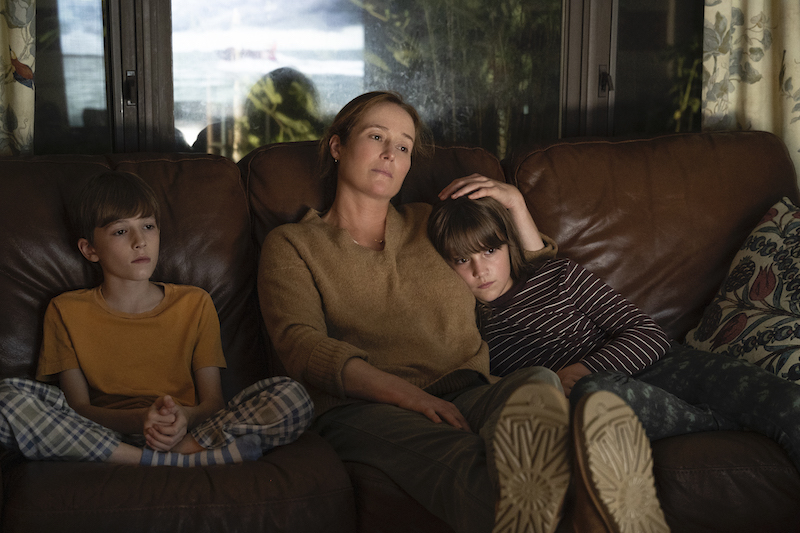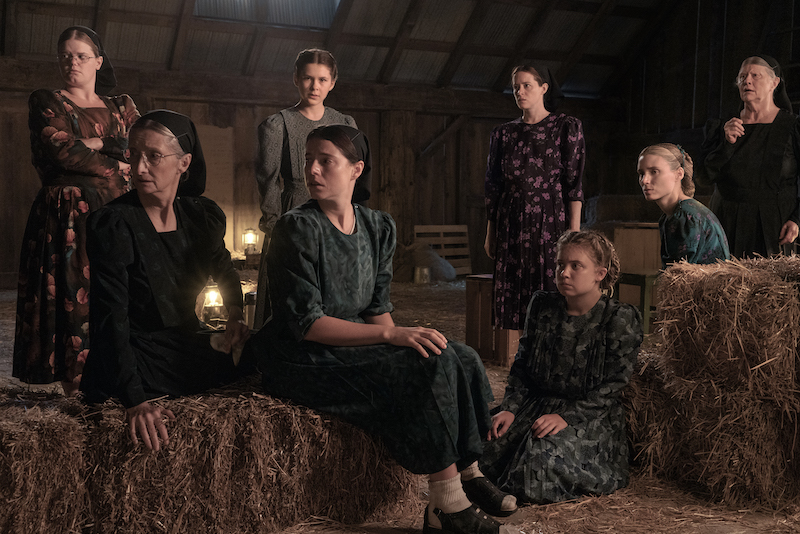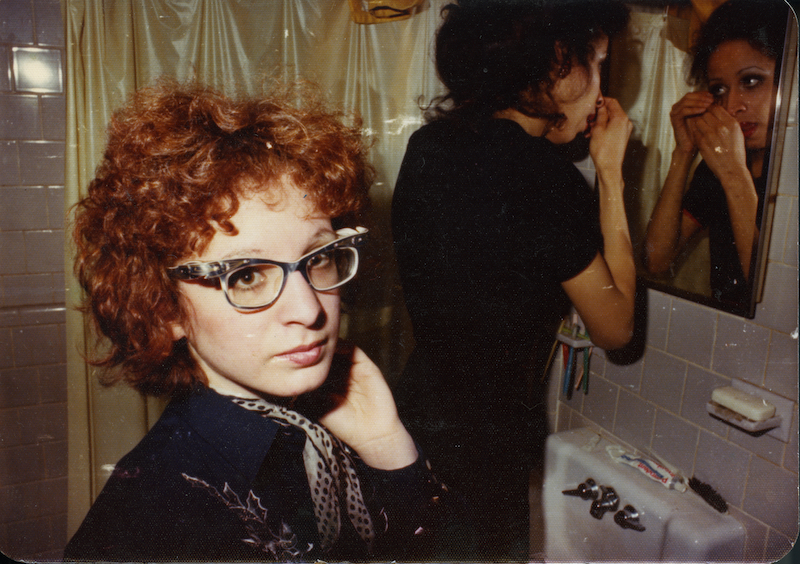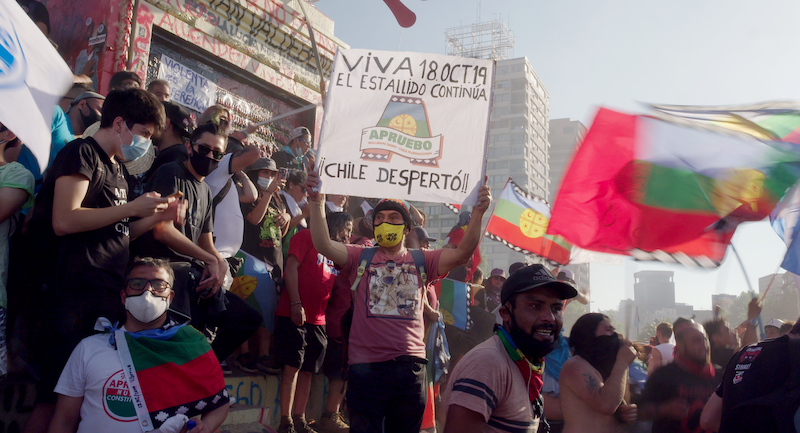Coming towards the end of the year, the London Film Festival generally has a “the best of the rest” feel to it, offering an excellent overview of the year’s releases. And what this edition shows is an encouraging, and very satisfying expression of women’s growing empowerment outside and within cinema.
The sense of voices being heard is even shared by the titles of two films made by and specifically about women, both of which must feature strongly in the upcoming awards season that leads to the Oscars. She Said concerns the exposure of Harvey Weinstein’s serial sexual abuse of employees and actresses, which fuelled the #MeToo movement; Women Talking partially has its origins in a large-scale sexual assault of women in a Mennonite community. While their stories start with suffering, they involve defiance and hope; both are fantastically made and overwhelmingly moving.
She Said stars Carey Mulligan and Zoe Kazan as New York Times investigative reporters Megan Twohey and Jodi Kantor, who in 2017 exposed the Miramax boss’s years-long abuses of women. Adapted by British scriptwriter Rebecca Lenkiewicz from Twohey and Kantor’s book, it’s directed by Maria Schrader as a journalistic procedural that brings to mind All The President’s Men: but rather than chasing down a corrupt presidential administration, the reporters are unearthing a rapist and the culture of enabling within the film industry. In each case, there is a chill of conspiracy, cover-up and threat; and in each case, part of the reporters’ success is down to “following the money”.
The film opens in 2016 and another famous man abusing his power, as Twohey investigates accusations of sexual misconduct by then presidential candidate Donald Trump: he wins the election regardless, while the reporter becomes the victim of death threats – a chastening context for the pursuit of the next predator.
 When Kantor starts scratching at persistent rumours about Weinstein, Twohey is still on maternity leave and struggling with postnatal depression. When she returns to work, the pair become a formidable team, albeit with a daunting task: persuading victims to go public with their stories, despite non-disclosure agreements and fear – the tools of the silence that Weinstein built around himself.
When Kantor starts scratching at persistent rumours about Weinstein, Twohey is still on maternity leave and struggling with postnatal depression. When she returns to work, the pair become a formidable team, albeit with a daunting task: persuading victims to go public with their stories, despite non-disclosure agreements and fear – the tools of the silence that Weinstein built around himself.
Mulligan and Kazan offer a nicely contrasting pair of personalities, Twohey the more assured, confidently dealing with high-powered lawyers and, ultimately, Weinstein himself; Kantor no less dogged but more touchy-feely, who tracks down and engages with the victims.
Of the victims, Ashley Judd – the first celebrity to go on the record for the Times – plays herself, displaying the same kind of courage and conviction as she did in real life. As former Miramax employees who are key to the investigation, Jennifer Ehle (pictured above), Samantha Morton and Angela Yeoh movingly convey the terrible emotional consequences both of sexual abuse and the enforced silence that follows.
Schrader (Unorthodox, I’m Your Man) uses interiors to create drama, suspense and symbolism, the “transparency” of the Times’s glass and steel contrasted with the darkened bars and restaurants in which the reporters chase down deep background sources for their story. She’s crafted a taut, gripping, desperately important drama.  Writer-director Sarah Polley’s adaptation of Miriam Toews’s 2018 novel Women Talking is centred on the women of a Mennonite colony, with a fateful decision to make.
Writer-director Sarah Polley’s adaptation of Miriam Toews’s 2018 novel Women Talking is centred on the women of a Mennonite colony, with a fateful decision to make.
For years, women and girls in this rural community have been drugged at night, and raped, the male elders explaining their bruises as punishment from god for their “wild female imagination”. But when one of the very real brutes is finally caught in the act, a group of the men are arrested. The elders go into town to arrange their bail, informing the women that they must either forgive their attackers or leave the colony – losing any chance of entering heaven. They have two days to decide.
The women see it as three choices: stay and forgive, stay and fight for their rights, which could well lead to violence, or leave. The members of two families, from grandmothers to teenagers, take up residence in a haybarn to debate, on behalf of everyone.
These include Ona (Rooney Mara), who is pregnant as a result of her latest assault, yet has a serene, idealistic hope that that this may be an opportunity to achieve equality in the commune; Salome (Claire Foy), who can barely contain her rage and has already attacked one of the men; and Mariche (Jesse Buckley), the victim of frequent beatings from her husband yet adamant they have no choice but to remain and forgive. For all of them, the prospect of the unknown world outside the commune is daunting.
Since the women are not taught to read and write, the mild-mannered, sympathetic teacher August (Ben Whishaw), possibly the only decent men in the place, takes the minutes of their meeting.
The bulk of the film is made up of their discussion, which is intense, often explosive, but also nuanced, with religion, maternal instinct, pragmatism, fear and anger all coming into play, and each woman’s position shifting as they influence each other towards a collective course of action.
Such a talky piece demands, and receives a tight script and compelling performances; while Foy and Buckley are spectacular, it feels churlish to single anyone out in such a brilliant ensemble. Polley paints an evocative sense of the bucolic setting, whose beauty is deliberately denuded by the ultra-muted palette. Hildur Guðnadóttir’s soundtrack invests the action with lyrical urgency.
 At one point, Rooney’s character observes that, “When we liberate ourselves, we will have to ask who we are.” Self-determination never seemed to be a problem for Nan Goldin (pictured left), whose trailblazing photography has always reflected a bold, taboo-breaking independence and expression. As she puts it in Laura Poitras’s fascinating documentary, All the Beauty and the Bloodshed, “photography was always a way to walk through fear.”
At one point, Rooney’s character observes that, “When we liberate ourselves, we will have to ask who we are.” Self-determination never seemed to be a problem for Nan Goldin (pictured left), whose trailblazing photography has always reflected a bold, taboo-breaking independence and expression. As she puts it in Laura Poitras’s fascinating documentary, All the Beauty and the Bloodshed, “photography was always a way to walk through fear.”
Poitras (Citizenfour) actually gives us two films in one, as Goldin’s recollection of her life and career runs in tandem with the photographer’s campaign to hold the Sackler family to account for their part in the opioid crisis that has claimed hundreds of thousands of American lives.
Goldin herself became “addicted overnight” to the notorious Oxycontin, produced by the Sacklers’ pharmaceutical firm Purdue Pharma. After she recovered, she established the pressure group PAIN, campaigning for arts institutions around the world (many of which feature her own work) to reject further donations and remove the Sackler name from their premises.
Poitras is on hand to capture some of Goldin’s campaigning stunts, at places like The Met and Guggenheim museums. But, in truth, the film is much more interesting when it charts the evolution of her art, as it explored the LGBT subcultures of Boston and New York in the Seventies and Eighties, and as Goldin recalls the tragic suicide of her older sister, whose own sense of self was appalling undermined by their parents.
Some 40 years after he filmed the political upheaval that led to the military coup against Salvador Allende, in Battle of Chile, veteran documentarian Patricio Guzmán has again been charting momentous social upheaval in his country.  My Imaginary County documents the mass social protests that started in October 2019 and continued for several months, against years of inequality, appalling living standards and institutional corruption, overseen by an elitist Establishment still adhering to Pinochet’s constitution.
My Imaginary County documents the mass social protests that started in October 2019 and continued for several months, against years of inequality, appalling living standards and institutional corruption, overseen by an elitist Establishment still adhering to Pinochet’s constitution.
At its height, more than a million people took to the streets, the biggest protest in Chile’s history, led by the young and, in particular, by women; as Guzmán says in his voiceover, “this movement will have the face and voice of women.”
The film combines on-the-ground footage and staggering aerial shots of the demonstrations and riots, which are particularly disturbing as Chile’s militarised police force uses rubber bullets, tear gas and water cannon against the protestors, with studio interviews with the campaigners. In keeping with Guzmán’s theme, these are all women, including a student, a journalist, a filmmaker, a photographer (one of the many who sustained deliberate eye injuries from the police) and a medic.
It’s a stirring film, of a movement that the director believes “altered the soul of Chile.” But though it ends with the election of the young, left-wing president Gabriel Boris, and moves towards writing a new, progressive constitution, that aim has yet to be realised. The octogenarian Guzmán will need to keep his cameras to hand.















Add comment